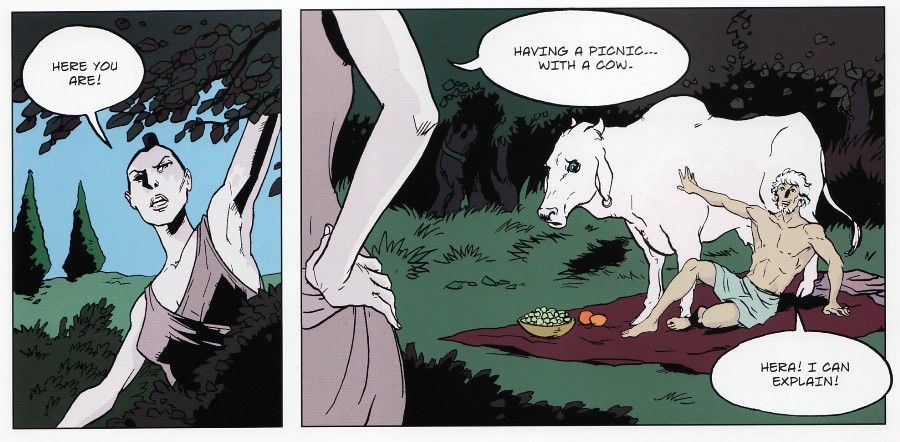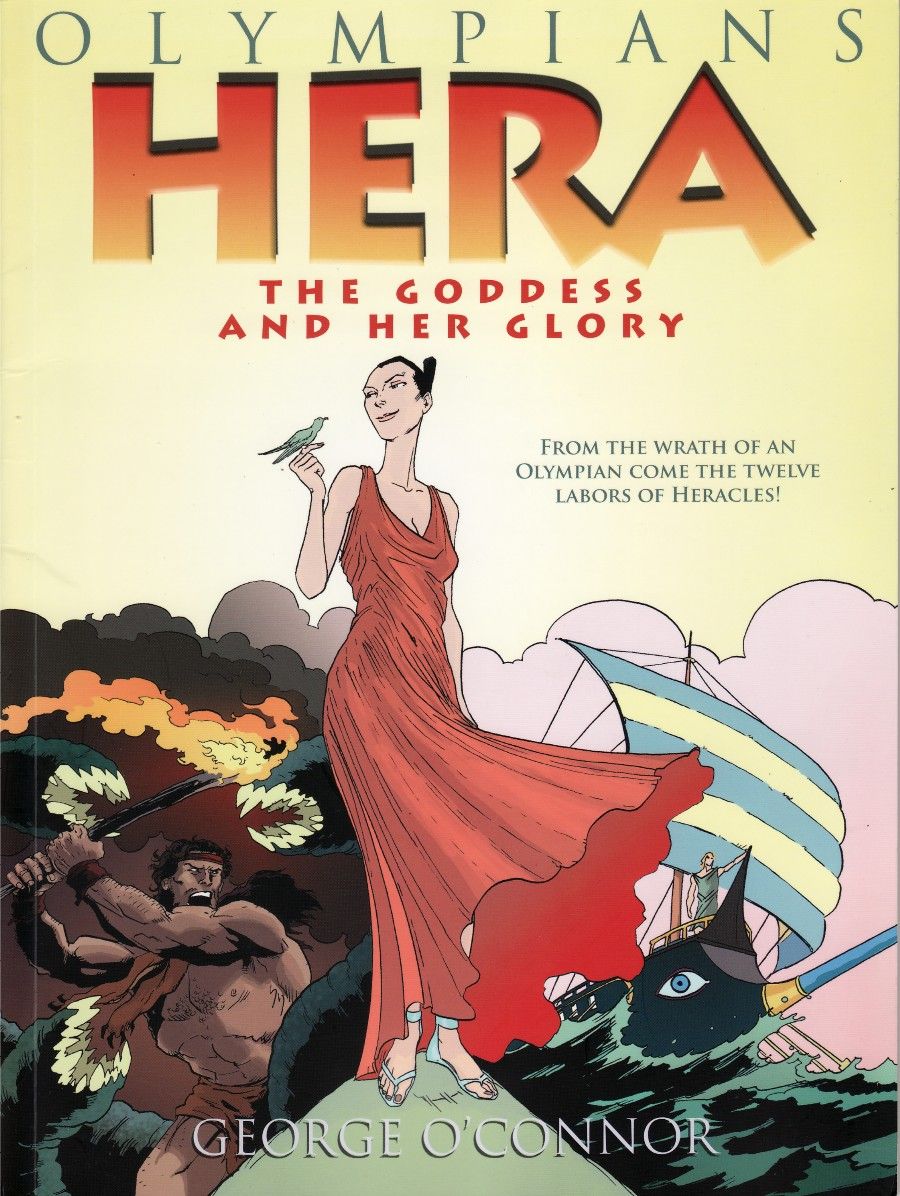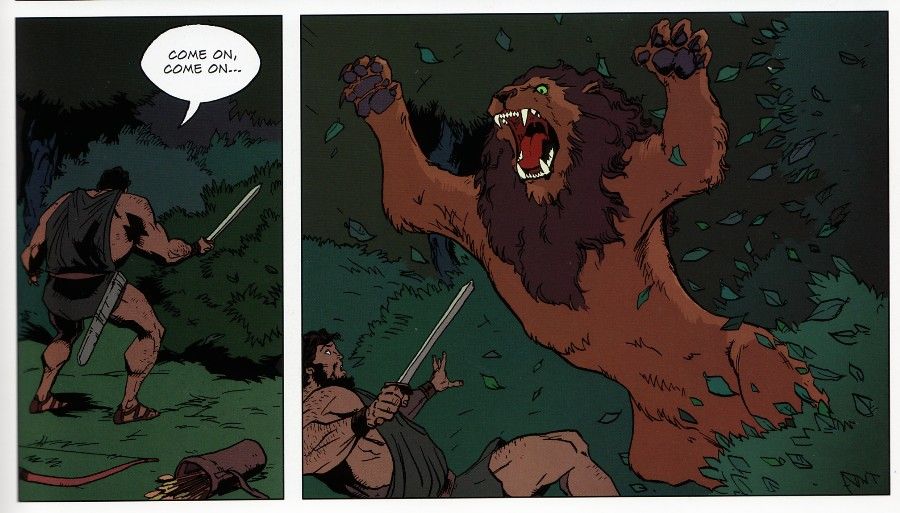Olympians, Volume 3: Hera - The Goddess and Her Glory
Written and Illustrated by George O’Connor
First Second; $9.99
I used to hate Hera. Still do, most of the time; the way she’s portrayed. I mean, even in the Greek mythology I read as a kid, Hera was always picking on Hercules; sneaking snakes into his crib; getting him to kill his own kids. And I liked Hercules. I grew up reading comics about him and catching the occasional Steve Reeves movie on Saturday afternoon TV. How could you not like a guy who killed an invulnerable lion and then wore its skin as armor? And none of those stories – right up to and including the ones with Kevin Sorbo – had anything good to say about Hera. Not until George O’Connor.
O’Connor’s been teasing his interpretation of the Queen of the Gods since the first volume of Olympians. That one was about Zeus, whom O’Connor presented as a hero, but one who couldn’t control his own libido. He’s not defined by his sex addiction, but it certainly influences his choices and makes life miserable for the women in his life. When Zeus first notices Hera in that volume, I couldn’t help but feel a little sorry for her. She’s just minding her own business, talking with a friend, and Zeus appreciates her from afar. “Oh, no,” I thought, knowing where that story would eventually end up.
This third volume of Olympians is where it ends up. Over the last couple of installments – and in interviews and on his blog – O’Connor’s been saying that Hera is his favorite goddess. He explains it again in the Author’s Notes to this book. “Part of it,” he writes, “is because she’s the one person that Zeus well and truly fears.” But the reason for that – and the reason she has the reputation that she does as a shrewish, jealous wife – is because Zeus is a terrible husband. The emphasis is O’Connor’s. So, though Hera’s always been my least favorite goddess, I’ve been eagerly awaiting O’Connor’s stab at changing my mind. His first two volumes, Zeus and Athena were so excellent that I had high expectations for Hera. If anyone could turn her into a hero, it was O’Connor.
Spoiler alert: he succeeds. He does it mostly with humor, a touch that he also gave to Zeus and Athena’s stories. Hera goes into her relationship with Zeus open-eyed. That doesn’t mean it hurts any less when he cheats on her, but it does allow her to have a sense of humor about things. She never winks at his infidelity though. Her humor is about keeping her sanity. Because she really does love this man and wants a good life with him, but she’s smart enough to know that she can’t. There are other reasons for her to stay with him though (it’s not a bad gig being Queen of the Gods, for one thing), so she does. And it’s heart-breaking to see how lonely that makes her as the other gods understandably stay far away from her and her relationship with Zeus. But she hasn’t forgotten how to smile and that’s a powerful thing about the way O’Connor portrays her.
Like with the Athena volume, Hera doesn’t spend all its time exclusively on its title character. Athena included stories about Perseus and Medusa; Hera spends a lot of time on the character who inspired the book’s sub-title: Heracles. My son’s also a big fan of these books, as well as a big fan of Hercules in general, so this was bedtime reading for a couple of nights. The first time I pronounced the name “Heracles,” he corrected me. “Hercules.” I couldn’t help but agree with him. I almost always prefer the Greek names of these characters over the Roman ones – Zeus instead of Jupiter; Hera instead of Juno – but Hercules is the exception, undoubtedly thanks to the comics and movies I grew up with. As O’Connor explains though, the name Heracles is an integral part of the story, since it means “Glory of Hera.” Like I said, it’s right there in the sub-title.
Where Hera’s story is all about style and trying to remain graceful under pressure (without always succeeding), Heracles’ story is of course about adventure and great deeds. All twelve of the labors get at least a couple of panels (with some of the more famous one like the Nemean lion, the Hydra, and cleaning the stables’ getting multiple pages). O’Connor also includes Heracles’ time with Jason and the Argonauts, even making homage to Ray Harryhausen’s version of that story. Because O’Connor has such an eye for depicting classic creatures in new ways, even a fight as well-known as Heracles’ battle against the Hydra feels fresh and exciting.
O’Connor’s successful at integrating Heracles’ story into Hera’s, because he lets Heracles’ tale comment on who Hera really is. I wouldn’t dream of spoiling how he does it, but O’Connor offers a profound insight that – for me, anyway – turns the Hera-Heracles relationship on its head.
A word of warning though. O’Connor’s not doing the work of a biographer here. He has a thesis – an image of Hera that he wants to create – and he picks the stories that best fit it. There are plenty of stories that do that, but he leaves out – for instance – Hera’s involvement in Heracles’ murdering his own children. (In fact, he omits the entire filicide incident.) That’s okay though. If you think trying to collate DC or Marvel history into sensible chronologies is daunting, it’s nothing compared to doing that with the scattered myths and legends of the ancient Greeks.
O’Connor’s not creating an exhaustive collection of Hera myths. He’s done a ton of research and offers a view of Hera that’s way more authentic than any I grew up with, but he never pretends that he’s been complete. It doesn’t matter though. Having seen what else O’Connor’s capable of, I suspect that – had he chosen to include Hera’s role in Heracles’ killing his kids – he could have figured out how to do that in a way that fit with his glorious interpretation of the goddess. It just would've been more depressing.



